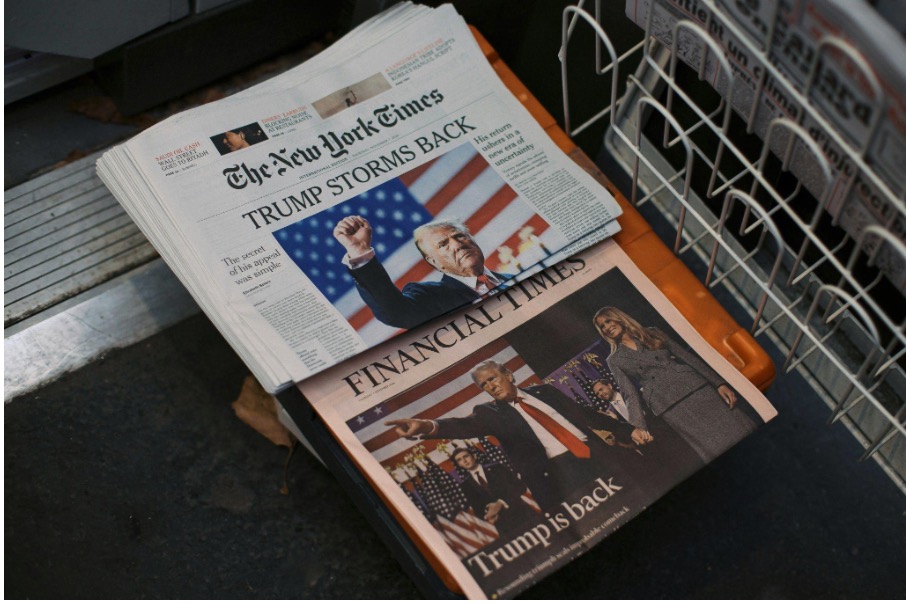Comments
META DESCRIPTION - Trump’s crypto-friendly policies spark US market surge. Will lighter regulations fuel growth or invite new risks in the digital asset space?
Cryptocurrency companies have spent more than $134 million in the 2024 US election, seeking a favorable regulatory environment. Long ignored in political debates in Washington, the cryptocurrency sector has become a major issue for the 47th US president, Donald Trump, who has constantly praised the benefits of this electronic currency and promised to ease the rules governing this market during his campaign. With Trump back in office, the value of cryptocurrencies has reached unprecedented levels. This new era could be beneficial to the growth of the crypto market in the US if the regulatory authorities can balance innovation with oversight.
What’s Changing
Trump presents himself as "the pro-innovation, pro-Bitcoin president that America needs. Previously opposed to digital assets by considering Bitcoin a 'scam,’ the billionaire radically revised his position in 2024 to the point of wanting to transform the United States into the crypto capital of the world. Since returning to the White House, he has appointed influential figures in the crypto sector, like Elon Musk, to key positions in his administration.
During his campaign, Donald Trump also supported the idea of creating a US strategic reserve of Bitcoins. This ambitious political promise would push the United States to invest in Bitcoin and consolidate its status as a reserve asset within the American central bank, the Federal Reserve Bank.
Trump has also shown support for the US Bitcoin mining industry when he met with some executives of North American Bitcoin mining companies at a conference in Nashville. He promised to develop more infrastructure to support the cryptocurrency mining industry, which is responsible for validating transactions and securing payments. This complex process requires computer servers to be able to store particularly large files.
These developments are reassuring for the sector and have led to a significant increase in the value of many cryptocurrencies, with some recording increases of more than 300% since the election.
The Current State of Crypto in the US
As of 2025, approximately 28% of American adults—around 65 million people—own cryptocurrency, nearly double the number from just three years ago. An additional 14% of non-owners plan to buy crypto on a crypto trading platform this year, with Bitcoin, Ethereum, and Dogecoin leading the pack. Despite this growing adoption, the market has seen turbulence. Bitcoin closed Q1 2025 at around $80,000, down 11.8% for the quarter, while Ethereum dropped 45.4%, ending near $1,800.
Institutional interest remains strong. Kraken, a major crypto exchange, recently expanded into the commission-free trading of over 11,000 US-listed stocks and ETFs. Meanwhile, the total value locked in Bitcoin-based decentralized finance (DeFi) is expected to nearly double to over $100 billion this year.
Trump’s Agenda
A key campaign promise of Donald Trump was to change the regulatory landscape for cryptocurrencies in the United States. As promised, the president-elect has started by replacing Gary Gensler, the head of the US Securities and Exchange Commission (the financial markets regulator), who was criticized for his repressive approach to cryptocurrencies and his choice to regulate digital currencies like traditional financial securities.
Here is what else Trump has done to date:
- Trump signed a bill overturning a revised IRS rule that would have classified decentralized exchanges as brokers, thereby subjecting them to stringent tax reporting requirements.
- The Justice Department's crypto enforcement unit has been disbanded, and the SEC has dropped high-profile lawsuits against major exchanges like Coinbase and Binance.
- An executive order created a working group to study the establishment of a strategic Bitcoin reserve, positioning digital assets as national economic tools.
These moves reflect a broader strategy to foster a crypto-friendly environment.

Potential Benefits of Regulatory Easing
Proponents argue that a lighter regulatory touch could yield significant economic benefits:=
- Encouraging innovation: Clearer, more accommodating regulations may encourage crypto startups and established firms to operate within the US, reversing the trend of companies relocating to more crypto-friendly jurisdictions.
- Stimulating investment: Reduced regulatory burdens could lower compliance costs and attract both retail and institutional investors, potentially leading to increased market liquidity and capitalization.
- Enhancing financial inclusion: By legitimizing digital assets, regulatory relaxation could provide underserved populations with greater access to financial services through crypto platforms.
Risks and Criticisms
Despite the potential benefits, critics warn of significant risks:
- Conflict of interest: The Trump family's involvement in crypto ventures, such as World Liberty Financial, raises concerns about potential conflicts of interest and the prioritization of personal gain over public interest.
- Security concerns: Loosening regulations may inadvertently facilitate illicit activities, including money laundering and fraud, if adequate safeguards are not maintained.
- Market volatility: Rapid policy shifts could contribute to market instability, as seen with recent fluctuations in Bitcoin's value following regulatory announcements.

Growth Without Compromising Integrity
Business leaders and executives must monitor developments in the crypto landscape, as these can influence various sectors, including finance, technology, and investments. The inherent volatility of cryptocurrencies requires increased vigilance and a thorough understanding of market mechanisms. The election of Donald Trump has injected new momentum into the cryptocurrency market, leading to significant valuations for several cryptocurrencies. While this is positive, careful consideration is necessary to ensure that growth does not come at the expense of market integrity and consumer protection.
###






